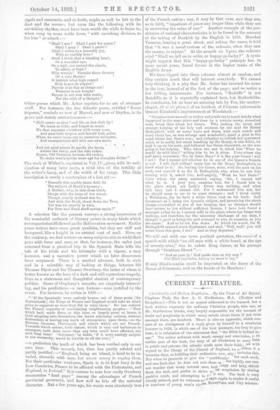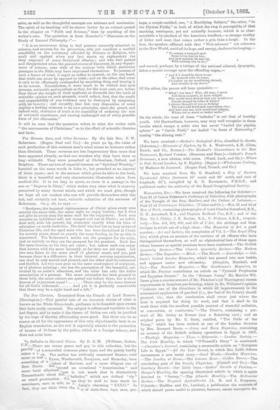CURRENT LITERATURE.
Christianity end Modern Scepticism.. By the Vicar of All Saints', Clapham Park, the Rev. A. G. Girdlestono, M.A. (Hodder and Stoughton.)—This is not an appeal addressed to the learned, but a book written expressly for ordinary Christian people, who are, as Mr. Girdlestone thitrIcs, very largely responsible for the amount of doubt and perplexity in which many minds about thorn, if not even amongst them, are involved. There is also an appendix, which con- sists of an abridgment of a reply given by himself to a secularist lecturer in 1876, in which one of the best passages, too long to give here, is in refutation of the statement that " the Bible is behind th" age." The writer enforces with much energy and liceoneil.CaitdiOonrs, iirtaan earlier part of the book, the duty of all Christians tinoclmudoeeis tbhciths. in public and private, the attacks made upon their faith; ,pd with " claalinaatiroe highly, one can-
not suob work, regard to the Clergy of the Church of England,
bounden duty, as fulfilling their ordination vow, whrf'o But when be proceeds to give the
and one feels that he does not rate them at
not wonder that many earnest ones, botbas;iesregeYptiacnci ismlabi, shrink ytystatiinng „ ;Jarit out. The book is very from the task, and prefer to strtiovel
positive truth, and attempting
clearly printed,, its common-se"e style ought to render it useful
and City mission.
to teachers of young men's clr8es' Evaugg4its'
aries, as well as the thoughtful amongst our artisans and mechanics. The spirit of its teaching will be shown better by an extract quoted in the chapter on " Faith and Science," than by anything of the writer's own. The quotation is from Herschel's " Discourse on the Study of Natural Philosophy :"— " It is no uncommon thing to find persons earnestly attached to science, and anxious for its promotion, who yet manifest a morbid sensibility on the testimony afforded by Science to Religion, who exult and applaud when any fact starts up explanatory (as they suppose) of some Scriptural allusion ; and who feel pained and disappointed when the general course of discovery, in any depart- ment of science, runs wide of the notions with which particular passages in the Bible may have impressed themselves. To persons of such a frame of mind, it ought to suffice to remark, on the one hand, that truth can never be opposed to truth ; and on the other, that error is only to be effectually confounded by searching deep, and tracing it to its source. Nevertheless, it were much to be wished that such persons, estimable and excellent as they, for the most part, are, before they throw the weight of their applause or discredit into the scale of scientific opinion on muols grounds, would reflect, first, that the credit and respectability of any evidence may be destroyed by tampering with its honesty ; and secondly, that this very disposition of mind implies a lurking mistrust in its own principles, since the grand, and indeed only, character of truth is its capability of enduring the test of universal experience, and coming unchanged out of every possible form of fair discussion."
It will be seen that the quotation refers to what the writer calls " the nervousness of Christians," as to the effect of scientific theories and facts.



































 Previous page
Previous page